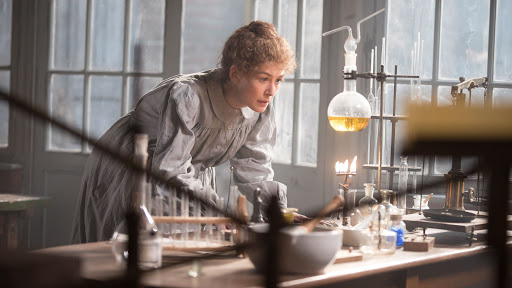Please welcome new contributor Juan Carlos Ojano, who you may know from the podcast "One Inch Barrier" - Editor

by Juan Carlos Ojano
Biopics are tricky. Inasmuch as making them are good bets for filmmakers to get awards consideration, they are also prone to falling to overused clichés. One overworn formula persistently plagues this genre: the all-encompassing chronicle of the major events in a real person’s life. Such is the case with Marjane Satrapi’s Radioactive, an unabashed ode to the legacy of Marie Curie and her contributions to science, that's now streaming on Amazon Prime.
While this biopic harbors a lot of distinct aesthetic choices, they are but distracting compensation for formulaic storytelling...

The film frames its narrative with Curie (Rosamund Pike), already in her later years (and in rubbery makeup), being rushed to the hospital after collapsing in her laboratory. It then backtracks to her years as a strong-willed scientist ostracized by male scientists. Then on to her marriage with another scientist (Sam Riley), an extramarital affair with her colleague (Aneurin Barnard) and so on.
It is already a lot, but it does not stop there. Not only do we get unnecessary flashbacks to her childhood, we also see small chapters of how her discoveries permeate in the lives of people all over the world: a child getting radiation therapy, the bombing of Hiroshima, the covert Manhattan Project, and the seismic disaster at Chernobyl.
All of these narrative threads are placed to highlight Curie’s impact on humanity, but they actually clutter the central story. What remains is the film’s idea of Curie: the persevering scientist who changed history. Marie Curie the character is never fully formed. Ironically, the best part of the film actually comes near the end. During the first World War when soldiers are having limbs from the smallest of injuries, Curie compels the government to use X-rays to help doctors diagnoses their wounds roperly.
What makes this portion of the film work well is the change of heart Curie goes through, gradual and sincere. While the film plants moments where the impact of her work is seen, this is the most involving because she is confronted not just with her own invention but putting it to work. With a surprising needle drop from Philip Glass’ score from The Hours (actressexuals will notice), it comes together in an emotionally resonant way. Not enough to salvage the earlier parts, but at least it’s there.

The film also suffers from the odd rhythm of the editing, making the storytelling even shakier. Take a montage where Marie is working closely with Pierre. The cutting choices in this sequence are intending to escalate the stakes of scientific discovery. This should be a moment where we root for Marie and her colleagues the most. However, it comes off as hastily composed, the cuts coming too quickly for us to fully absorb the magnitude of the moment. Two more sequences, an accident and a dream sequence, also suffer from a collision and stitch-work of images that hinder full involvement.
More satisfying is the cinematography. Radioactive is lensed by Oscar winner Anthony Dod Mantle (Slumdog Millionaire), and the film really gets adventurous with its use of color. There are scenes where the unusual clash of colors just pop out. The occassional use of bright colors is arguably distracting but it is at least a choice that takes major risks.
All of the film's busy problems are what Rosamund Pike’s performance has to deal with. If you're also a self-confessed actressexual, you're probablyused to seeing great performances trapped in films that don't deserve them and Radioactive is no exception. Pike's interpretation of the madam is striking. While Curie's steely determination is the overarching characteristic both the film and Pike lean into, Pike finds several dimensions within it, beyond what the something broad or bland writing suggests.
Pike continually rises to the occasion, giving Marie Curie nuance and detail. A quick touch in her hair, a sudden hesitation to enter a hospital, a slow reaction to a slap, the eagerness to kiss a married man, a decisively proud posture amidst surrounding gossip - these are all small details that complete this character’s journey. The flatly written scenes are rescued from themselves by an actress who knows how to take control of the material.

Rosamund Pike’s career-best work includes her Oscar-nominated role in Gone Girl and her Golden Globe-nominated leading role in A Private War. Her performance in Radioactive might not reach the heights of those but given this uncharacteristically empty film year, Pike deserves to be in the Best Actress conversation again.
Radioactive exists somewhere between the inconsistent risk-taking of The Theory of Everything and the offensive blandness of Bohemian Rhapsody. All in all, it's an interesting mess: well-intentioned, even daring at times, but largely weakened by the writing and its hit-or-miss visual style. Still, watch it for Ms. Pike. C